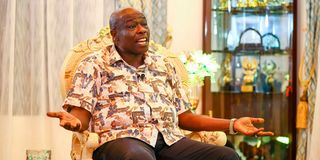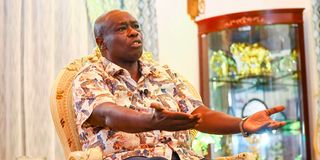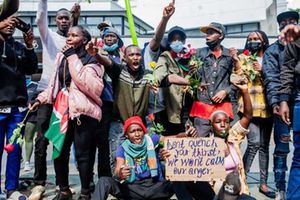
Former Deputy President and DCP leader Rigathi Gachagua gestures during an interview with NTV at his Karen home in Nairobi on June 27, 2025.
When Gen Z protesters took to the streets in June 2024 demanding accountability and radical political change, few could have predicted that their outrage would resurrect the political fortunes of former Deputy President Rigathi Gachagua.
Impeached and politically wounded, Mr Gachagua has since re-emerged as a self-declared “father” of the youth-led movement turning street fury into a powerful personal brand.
What began as leaderless dissent over the Finance Bill, 2024 quickly evolved into a national reckoning, and in its wake, Mr Gachagua found an opening.
While President William Ruto scrambled to contain the fallout and opposition leader Raila Odinga walked into government, Mr Gachagua took the risky gamble of siding with the disillusioned youth.
During an exclusive interview on NTV on Friday, the former DP claimed that he began supporting the Gen Z movement while still in office, before his impeachment in October last year.

Former Deputy President and DCP leader Rigathi Gachagua gestures during an interview with NTV at his Karen home in Nairobi on June 27, 2025.
Mr Gachagua, who has since launched the Democracy for Citizens Party (DCP) — which he promotes as a political home for Gen Z — now seeks to rival Mr Odinga, long seen as the face of youth activism.
However, Mr Odinga is perceived by young people as being out of touch after aligning with President Ruto's administration.
While Mr Odinga brought his older support base into the broad-based government, he left youth leadership to younger allies like Nairobi Senator Edwin Sifuna and Embakasi East Member of Parliament Babu Owino.
Plotting regime change from within
To critics like Laikipia East MP Mwangi Kiunjuri, Mr Gachagua’s admission that he backed the Gen Z protests while still Deputy President indicates he was “plotting regime change from within.”
“He came across in that interview as someone whose main agenda was illegal regime change. After impeachment, he’s continuing the same agenda under the guise of youth empowerment,” said Mr Kiunjuri.
However, Mr Gachagua clarified that he aligned with the Gen Z movement only after the protests had already begun.
“Not before—they had already hit the streets,” he said. “I realised that the President was alienating the youth, and that was not politically wise.”
He said he saw it as a worthwhile political investment aligning with disillusioned youth even at the cost of his job, security and political perks.
“It was not, is not, and will never be about violent regime change. It is about pushing the President to either resign or face the 2027 ballot. The violent change narrative is a distraction meant to dilute the message that Dr Ruto is unfit to lead,” Mr Gachagua said.
“I told the President that youth unrest was brewing and the majority of Kenyans sympathised with them yet his intelligence services were blind to it,” he said.
The President Ruto attempted to reach out to Gen Z who made a list of demands, including rejecting the Finance Bill,2024 and sacking corrupt State officials.

Former Deputy President and DCP leader Rigathi Gachagua gestures during an interview with NTV at his Karen home in Nairobi on June 27, 2025.
Democratic Congress youth leader Gladys Njoroge said Mr Gachagua saw the Gen Z protests as godsend.
“The protests were not about Gachagua, but the government’s brutal response gave him the political ammunition he needed to reinvent himself,” she said.
When the protests erupted last week to commemorate victims who were killed during the June 25, 2024 invasion of Parliament, the government responded with force. President Ruto called the protesters "treasonous anarchists" and promised a crackdown on “all involved, including their financiers.”
But Mr Gachagua said: “These are not criminals. They are our children, crying out to be heard. When did we stop being a listening government?”
Political scientist John Okumu said Mr Gachagua’s impeachment was a turning point. He said the Gen Z demands were politically sensitive, but Mr Gachagua saw blackmail and also a golden opportunity.








